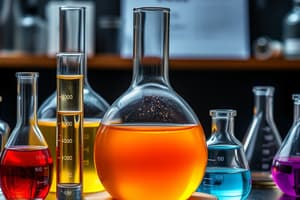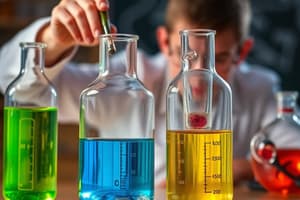Podcast
Questions and Answers
What distinguishes an independent variable from a dependent variable in an experiment?
What distinguishes an independent variable from a dependent variable in an experiment?
- The dependent variable is affected by changes in the independent variable. (correct)
- The independent variable is measured in response to changes.
- The independent variable does not change during the experiment.
- The dependent variable is manipulated by the researcher.
Which step in the scientific method involves making predictions based on a hypothesis?
Which step in the scientific method involves making predictions based on a hypothesis?
- Prediction (correct)
- Experiment
- Observation
- Conclusion
How does the concept of a control group contribute to scientific experimentation?
How does the concept of a control group contribute to scientific experimentation?
- It serves as a baseline for comparison against the experimental group. (correct)
- It eliminates the need for a hypothesis.
- It allows for manipulation of variables without measurement.
- It ensures that all variables remain constant during the experiment.
Which characteristic of scientific inquiry involves the willingness to accept new evidence that challenges existing beliefs?
Which characteristic of scientific inquiry involves the willingness to accept new evidence that challenges existing beliefs?
What is the primary difference between a scientific law and a scientific theory?
What is the primary difference between a scientific law and a scientific theory?
Which of the following best defines hypothesis in the scientific method?
Which of the following best defines hypothesis in the scientific method?
What role does communication play in the scientific method?
What role does communication play in the scientific method?
In the context of scientific inquiry, which of the following qualities refers to the commitment to report data truthfully?
In the context of scientific inquiry, which of the following qualities refers to the commitment to report data truthfully?
Flashcards
Scientific Method
Scientific Method
A systematic process for understanding the natural world, involving observation, experimentation, and hypothesis testing.
Hypothesis
Hypothesis
A testable statement explaining a phenomenon.
Independent Variable
Independent Variable
The factor changed by the researcher in an experiment.
Dependent Variable
Dependent Variable
Signup and view all the flashcards
Control Group
Control Group
Signup and view all the flashcards
Observation
Observation
Signup and view all the flashcards
Data
Data
Signup and view all the flashcards
Theory
Theory
Signup and view all the flashcards
Study Notes
Scientific Method
- Science is a systematic approach to understanding the natural world.
- It relies on observation, experimentation, and the formulation of testable hypotheses.
- The scientific method is a cyclical process, not a linear one.
Steps in the Scientific Method
- Observation: Recognizing a phenomenon or problem.
- Question: Formulating a specific question about the observation.
- Hypothesis: Proposing a testable explanation for the phenomenon.
- Prediction: Making a forecast about the expected outcome of a test.
- Experiment: Designing and conducting a controlled test to gather data.
- Analysis: Interpreting the data collected from the experiment.
- Conclusion: Evaluating whether the data support or refute the hypothesis.
- Communication: Sharing findings and conclusions with others. Important for peer review and further research.
Key Concepts in Science
- Hypothesis: A testable statement that explains a phenomenon.
- Variable: A factor that can change in an experiment.
- Independent variable: The factor manipulated by the researcher.
- Dependent variable: The factor measured in response to the change in the independent variable.
- Control group: A group in an experiment that does not receive the treatment.
- Experimental group: A group in an experiment that receives the treatment.
- Data: Information collected from an experiment or observation.
- Theory: A well-substantiated explanation of some aspect of the natural world, based on a large body of evidence.
- Law: A descriptive statement or equation that reliably predicts events under certain conditions.
Branches of Science
- Biological Sciences: Focus on living organisms.
- Examples: Biology, Genetics, Ecology, Zoology.
- Physical Sciences: Focus on nonliving matter and energy.
- Examples: Physics, Chemistry, Astronomy, Geology.
- Earth Sciences: Focus on the Earth, its composition, and processes.
- Examples: Geology, Meteorology, Oceanography.
Scientific Attitudes and Practices
- Curiosity: Driving force behind scientific inquiry.
- Skepticism: Critical evaluation of claims and evidence.
- Open-mindedness: Willingness to consider alternative explanations.
- Objectivity: Avoiding bias in observations and interpretations.
- Honesty: Accurate reporting of data and methods.
- Perseverance: Continuing to investigate despite challenges or setbacks.
- Collaboration: Working with others in research.
Scientific Literacy
- Understanding fundamental scientific concepts and processes is essential for informed decision-making.
- Evaluating scientific information critically, distinguishing between reliable and unreliable sources.
- Engaging in scientific discussions and debate.
- Applying scientific knowledge to real-world problems.
Scientific Misconceptions
- Oversimplification of complex issues.
- Misapplying scientific findings to unrelated situations.
- Confirmation bias, prioritizing information supporting existing beliefs.
- Lack of understanding of methodology and scientific process.
- Misinterpretation or misuse of statistics.
- Mixing science with opinion or personal belief.
Studying That Suits You
Use AI to generate personalized quizzes and flashcards to suit your learning preferences.




